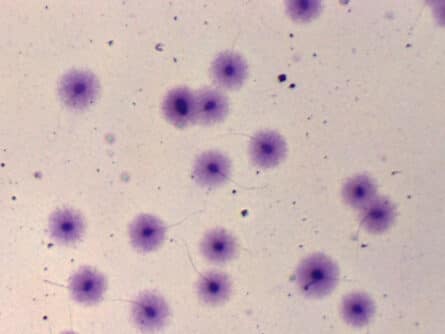What is the sperm fragmentation test?
This is a diagnostic test which measures the integrity of the genetic material in a sperm sample by analysing breakages on sperm DNA strands. These breaks may be single stranded or double stranded. Following fertilisation, it is more difficult for an egg to repair a break if it is double stranded. If errors are made during the repair process then fertilisation may fail, the embryo may stop developing at some point in the process -without reaching blastocyst stage-, or an early miscarriage could occur, among other consequences.

When is this technique used?
- When poor quality embryos have been obtained in previous cycles.
- Advanced paternal age. There is a positive correlation between the male’s age and elevated fragmentation levels.
- Tobacco, like many other environmental toxins, is able to cause damage to the genetic material of spermatozoids.
- Sperm abnormalities. There is a higher incidence of sperm DNA fragmentation if the sperm study presents other abnormalities.
- Varicocele. Patients presenting this pathology generally have high levels of sperm DNA fragmentation.
- Infections. The presence of leukocytes in semen causes an increase in reactive oxygen species which can cause damage to sperm DNA.
First fertility visit is free
Request your first appointment cost-free at the clinic closest to you
Frequently asked questions about sperm fragmentation
There are some factors which can irreversibly damage the DNA of spermatozoids. These situations can occur during the production or transport of sperm cells and include:
- The generation of reactive oxygen species or oxidative stress.
- Abnormal sperm chromatin packaging. Errors in the substitution of histones for protamines during the process of spermiogenesis.
- Deficiencies in recombination.
- Apoptosis in the process of spermatogenesis once the spermatozoid has left the tubules.
- External factors that may lead to or worsen the effects mentioned above, among which we can mention certain environmental conditions such as contamination, tobacco consumption, elevated testicular temperature or a pathology such as criptorquidia, varicocele, inflammatory processes or infection of the genital tract, cancer, episodes of fever and stress, among others.
There are several different techniques available to study sperm DNA fragmentation, ranging from very simple to very complex.
One of these is the Sperm Chromatin Dispersion technique which is the one we routinely use at Ginemed. This is a quick test and results are very easy to interpret, making it possible to effectively diagnosis the male being tested in a short period of time.
This way, the patient that presents damaged sperm DNA can be treated quickly and we can improve the results of the assisted reproduction treatment the couple is going to undergo.
At our clinic we focus on making improvements the following ways:
- Use of antioxidant medications and vitamins to reduce fragmentation, according to test results, and frequent ejaculations.
- Frequent ejaculations leading up to the day of sperm collection, and use of the first fraction of the ejaculate (two fraction collection technique).
- Decision to use MACS, IMSI, etc., if determined necessary by laboratory personnel.
